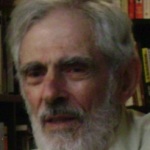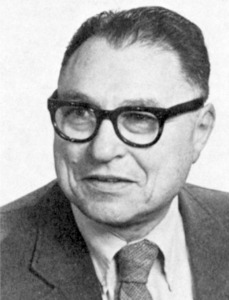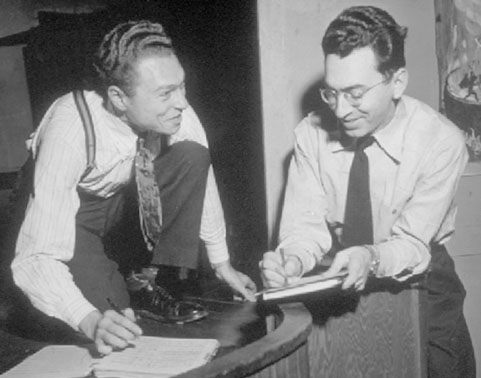By Chandler Davis
Chandler Davis had to ply his trade in Canada, turning
emeritus at the University of Toronto in 1992 after thirty
years in the tenured ranks. Nevertheless he was not forgottenby US colleagues, and was even elected Vice-President of the American Mathematical Society in 1991.
Without being a historian, anyone old enough to remember the notorious Red-hunt of 1947-1960 may feel some déjà vu seeing the frenzy with which criticism of Israel is savaged today. The Illinois campus is trying to come to terms with the shabby way your top administration (and in the wings a few donors accustomed to getting their way) have treated Prof. Steven Salaita. Several of you have been reminded of the Red-hunt. It takes me back…..
In 1950, I was a fresh Ph.D. hoping to break into the faculty ranks — preferably without selling my soul. All my fellow left-wingers in the universities knew they might come under attack. My professor and mentor Dirk J. Struik at MIT had already been attacked in the press as a communist (he was to spend 1951-55 under indictment for conspiracy to overthrow….., and suspended but not fired from his professorship). His daughter (and my friend) Ruth Rebekka Struik was a graduate student and assistant at the University of Illinois. That very year, 1950, she was told her support would not be renewed. A coincidence, do you suppose? We all took it as just part of the pattern. She took refuge in Canada for a few years, and returned to a successful career in the US; she is now emerita at the University of Colorado.
Hundreds of us were targets of political attack, whether public as in Dirk’s case or tacit. We compared notes, sub rosa. Thus my friend Ray Ginger, the American historian, told me he had had to leave his Harvard job, and it was his choice whether to protest. His school knew that if he uttered a public complaint he would be consigning himself to the blacklist, and Ray elected to keep it quiet; and indeed, after a few years in limbo he was able to get academic employment again.
Investigating committees held sensationalized hearings into “subversion.” Witnesses were asked about their association with the Communist Party and other organizations; if they answered any such question they were deemed to have waived their right under the Fifth Amendment to remain silent, and thus became liable to prosecution if they refused to answer any other questions — including names of their associates. This became a terribly familiar routine, whether by the House Committee on Un-American Activities (HUAC), by other Congressional bodies such as the Jenner Committee, or by their emulators in some states: a Massachusetts committee took part in the harassment of Dirk Struik, and Illinois had been threatened with getting such a committee by Senator Paul Broyles repeatedly since 1947.
At Harvard, Cazden worked with, among others, Walter Piston and Aaron Copland. His Ph.D. dissertation, Musical Consonance and Dissonance, ran over 900 pages. From 1945 to 1960 he was musical director of Camp Woodland, a center influenced by John Dewey’s “Progressive Education” model, and located in the Catskills. Cazden was interviewed for, and mentioned in, Victor Navasky’s book about the blacklist in academia, Naming Names. This year is the centenary of his birth; for more information, see the website http://www.normancazden.com/biography/
In 1953, Norman Cazden was a faculty member at UIUC in music. Norman was a Harvard Ph.D. in musicology (whose thesis I enjoyed reading, by the way), but he was much more: he taught music, conducted concerts and accompanied performers, and ran a regular program on music on the campus radio; one of his many compositions was performed in this period by an orchestra in Springfield. He was also associated with individuals and causes of the sort that were under attack in those days; why, he had been for years director of music at Camp Woodland: very suspicious! His wife, Courtney Borden Cazden, went to Springfield as part of the successful campaign to stop the Broyles Bill. (The campus opposition to Broyles’s perennial subversive-hunting campaign was powerful through 1953, but fell short in 1955.) Norman and Courtney took part also in protests of the trial of Julius and Ethel Rosenberg as “atomic spies,” and in mourning their execution in 1953.
In short, it was not surprising that HUAC came nosing around about Norman. Their inquiries at the University presumably were the reason why the promotion and tenure he had been orally promised for 1953 did not come through. In 1954, he was called to the stand, and it was not surprising that he declined to answer, on the basis of his Fifth Amendment rights. Norman and Courtney by this time had quietly left Illinois; Norman continued giving private lessons, teaching at Camp Woodland, and performing and composing. After some years he was able to escape the banishment. At the time of his too-early death in 1980 he was a much-loved professor at the University of Maine. Courtney is still with us, she is emerita at Harvard Graduate School of Education.
My wife and I first met the Cazdens, if I remember right, when Norman and I were in the same hot water. I don’t know which mutual friend put us in touch. I was a tenure-track faculty member at the University of Michigan, and was subpoenaed in 1953 to testify before HUAC. Whether I would rather have tried to make myself inconspicuous for a while, as my friends Ray Ginger and Norman Cazden did, I don’t know; the option wasn’t offered me, HUAC wanted to expose my evil deeds with full publicity, and in May 1954 they did. The story ends happily for me as well, ultimately, but I was obliged to emigrate. I am now emeritus at the University of Toronto, no cause for complaint.
Only for HUAC does the story not end happily. Just as Senator Joseph McCarthy’s omnipotence had been punctured in 1954, the apparently unstoppable HUAC had hardly any clout after 1960.
Yes, I think there is more than superficial resemblance between the dogging of left-wingers in those days sixty years back and the attacks on academics like Joseph Massad, Norman Finkelstein, and Steven Salaita today. The Red-hunters never called us terrorists or anti-Semites or (gasp!) uncivil, but they called us subversive and disloyal in the same fevered, evidence-free way, and they did their very best to expel us from the community. There’s nothing for it but to stand up to them.



